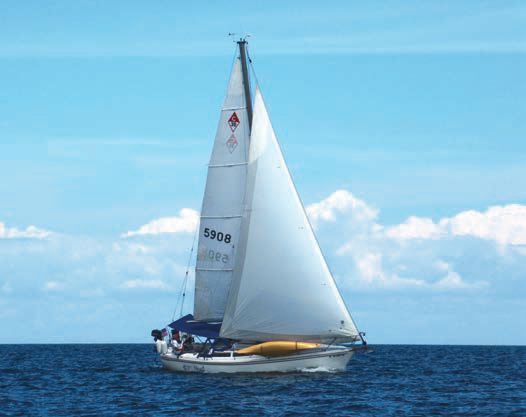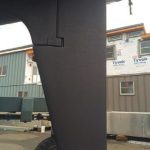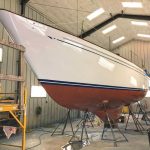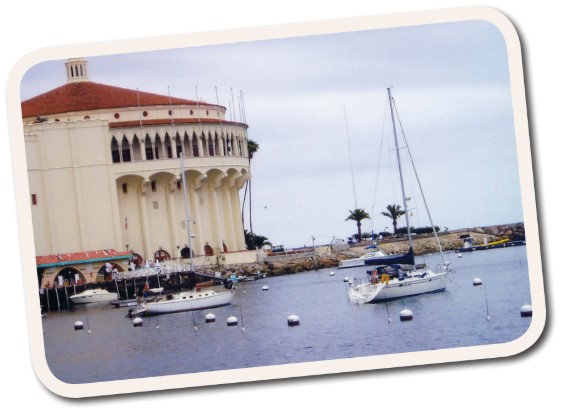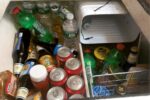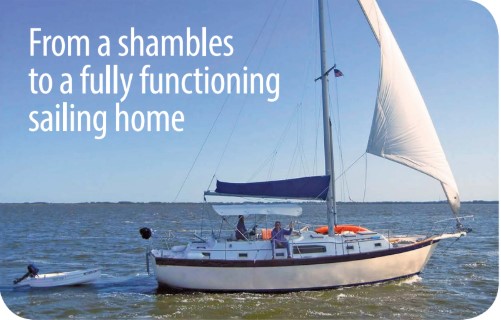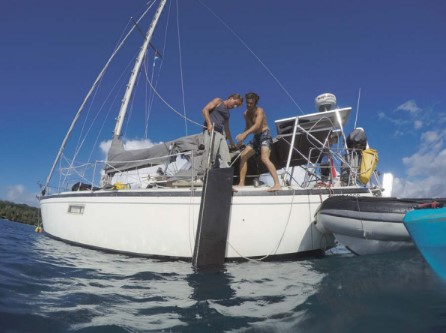When a plethora of boat problems bedevil a two-week cruise, fellow boaters come to the rescue
Issue 149: March/April 2023
On a brisk Saturday morning in August, my husband, Larry, and I set off on our 1990 Catalina 30, Njord, for our annual Brockport Yacht Club Cruise with four other boats. We planned to cross Lake Ontario from our club just west of Rochester, New York, to Cobourg, Ontario, and travel east through the Bay of Quinte, on the lake’s northern shore. Our friends planned to sail for a week, then we would continue by ourselves on to Kingston, Ontario, at the northeastern end of Lake Ontario before slowly wending our way back home — a leisurely two-week sail.
 We set sail, notwithstanding a stiff wind from the wrong direction. We raised sails (one reef in the main, full 143% jib) but had the engine running as we made adjustments for the 22- to 25-knot winds and 6-foot seas. One of our friends radioed us to say that there was no water coming from our engine — bad news. Larry turned the engine off and I tried to hold course while he went below to diagnose the problem. But we were slamming into the waves and bouncing from side to side, and he couldn’t do it while underway.
We set sail, notwithstanding a stiff wind from the wrong direction. We raised sails (one reef in the main, full 143% jib) but had the engine running as we made adjustments for the 22- to 25-knot winds and 6-foot seas. One of our friends radioed us to say that there was no water coming from our engine — bad news. Larry turned the engine off and I tried to hold course while he went below to diagnose the problem. But we were slamming into the waves and bouncing from side to side, and he couldn’t do it while underway.
At that early juncture in the trip, we had our sails trimmed to our intended course, and briefl y considered continuing to sail across the lake. We could deal with what was likely a bad impeller after we arrived at the marina in Canada. Good sense quickly prevailed. No engine meant no maneuvering in the tight quarters of a marina, the wind might well die halfway across the lake, and it was a holiday weekend in Canada, so we might not be able to get parts if we needed them. We had no choice but to return to the yacht club.
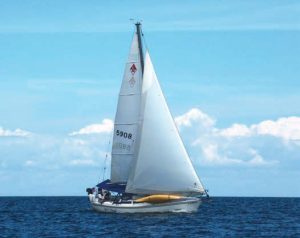
We were only about an hour from home and the wind that was on the nose going out was in our favor going back, allowing us to sail right up to the guest dock at the club. By postponing our start for a day, we avoided a nasty crossing with daylong 6- to 8-foot seas and 25- to 30-knot winds. Larry was able to pull the impeller (which was indeed the source of the problem) and we had a spare. It could have been worse.
That night we stayed on the boat at the club. I was not quite fi nished cooking dinner on the stove when the fl ame under both burners went out. The propane tank, a large tank that feeds both the stove and the rail-hung grill, was empty. No propane meant no way to prepare meals on our two-week voyage. To complicate matters, the tank and its fi tting are obsolete, and no one would refi ll the tank. It was then approaching 8 p.m. There was nowhere to purchase the right tank and fi tting that night, and we could be delayed for days if we ordered one.
A good friend at the yacht club has a sister boat to ours, but with the newer propane system. He had Covid-19 and therefore couldn’t go on his own scheduled cruise, and his boat was sitting at the dock. After a quick phone call, he agreed to let us use his tank. Fortunately, his boat is secured by a combination lock, so we could get into it without making the hourlong trip to his house and back for a key. After some struggle, the old tank came out and the borrowed tank went in. Good to go! It could have been worse.
We headed out again on Sunday, this time with too little wind in the wrong direction, but relatively calm seas and clear skies. Though we couldn’t sail, we had an uneventful 35-mile crossing. We met up with our friends and enjoyed a delightful evening and a day in Cobourg. The next morning as I was cleaning up the dishes, we unaccountably ran out of water, having just fi lled the two large tanks on board before we left the yacht club. The bilge pump went into overdrive and a veritable gusher erupted from the outfl ow. Clearly there was a leak, and the water tank was emptying into the bilge and out into the harbor. But where was the leak? And how would we fi x it on a holiday in Canada?

After tracing the plumbing pathway and brainstorming with one of our fellow cruisers, Larry found that a clamp securing two sections of plumbing had come apart. We had no spares (make a note to self). But our friend did, and kindly gave us one and helped make the repair. The bilge pump had been up to the task, so there was no water where it didn’t belong. Add water to tanks; no harm done. It could have been worse.
After another day in Cobourg, two of our companion boats turned for home and our now-reduced fl eet set off for Trenton, about 34 miles east. The light wind was not quite in the right direction, but at least we could motorsail. We arrived at one of our favorite marinas, Trent Port Marina, without incident and spent a couple of days enjoying the facility and the town. But something was telling us not to press our luck and continue east on our own. The other two remaining boats were ready to head home, so the three boats headed back to the Murray Canal to get to Lake Ontario. Our intention was to split off from the others and go west of our home port and then on to a yacht club at Wilson or Niagara-onthe- Lake; if we had further problems, we would at least be a relatively easy drive away if someone had to come get us.
The next morning, we set out under bright sun with hopes for some wind from the right direction once we got to the lake. We were motoring to the canal with Larry driving while I sat next to the companionway. I turned my head and caught a whiff of something electrical. Larry headed down to check the engine and a cloud of smoke suddenly billowed into the cabin. I turned off the engine. Larry explored the source of the smoke and determined that a bearing in the alternator had probably gone bad. Once again, we had no engine, and this time no spare part on our boat or anyone else’s.
However, we always carry a towline, and one of our companion boats was able to tow us the mile back to the marina. The marina had quick and competent dockhands at the ready to catch us, and the Trent Port Marina is, as I said, one of our favorites — staff are helpful, the grounds are lovely, and the shower rooms are the best anywhere on the lake. Larry determined that the problem was not just the bearing — it was the alternator itself, which was toast. There was an auto parts store within walking distance. No luck there, but Larry is without peer when working the phone to solve a problem, and after an hour following a trail of tips (try this guy, try this place), Larry found an angel in Kingston at Auto Electric Rebuilders. More remarkable, this angel had the needed alternator in stock, was going to be driving by our marina the next morning (a Sunday!) on his way to Toronto, and would drop it off. It could really have been worse.
Larry can fix anything mechanical. Electrical, not so much. He expressed his concerns to the angel, who assured him it could not be simpler to install and couldn’t go wrong. He was sorry he had to be on his way, but he had places to go, people to see. But of course, it could go wrong, and it did. When we tried starting the engine with the new alternator installed, black smoke filled the cabin. With the engine off, Larry pulled it all apart again; this time a fuse had blown and the starter had fried. Now we needed a new starter.
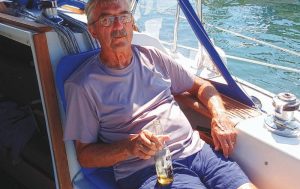
Another call to our angel turned up the likelihood that the needed starter could be found Monday morning and shipped overnight. The new starter went in without much stress. The blown fuse was a problem, but as Larry was sharing our tale of woe with a boater down the dock, the boater said, “Wait — I’m sure I have extras.” (Another note to self.) And he did. In the meantime, the ever-responsive marina staff brought a portable pump-out machine to our boat (desperation had been setting in). Problem solved. It was not good, but it could have been worse.
As Larry was hooking everything back up, he connected the fuse and the engine suddenly started to turn over. He had inadvertently hot-wired the starter. The engine key was clearly in the off position. The starter button did not start the engine. He could find no way to wire the new starter without starting the engine.
Hot-wiring the engine did, in fact, work — the engine started right up and purred happily. There was no reason we couldn’t start the engine that way the next morning and head out across the lake. If we were so lucky (ha!) as to be able to sail, we could turn off the engine by shutting off the fuel and we could restart it by hot-wiring it again. And so we did. By now, we had given up any thought of visiting other ports and wanted nothing more than to be at home on our own dock. The wind was extremely light and in entirely the wrong direction. We never put up a sail, but nine hours later we pulled up to the dock at our club. It could have been MUCH worse.
Was this the trip from hell? Well, maybe the trip from heck. No one was hurt, we were never in danger (if smoke had turned to flame, we had fire extinguishers at hand), we found a knowledgeable and astonishingly responsive parts source, and we were with resourceful, kind, and helpful fellow sailors.
We may have been plagued with bad luck and even bad judgment, but we were somehow protected from ourselves and the ill winds of fate, and we are very grateful. It could have been so much worse.
Trish Brantingham came to sailing in her 50s when she married Larry Beneway, who had been sailing all his life. They started with a Catalina 22, detoured to a Noelex 30 for a few years, and came back to a Catalina 30 in 2015. They race a little but mostly love cruising Lake Ontario.
Thank you to Sailrite Enterprises, Inc., for providing free access to back issues of Good Old Boat through intellectual property rights. Sailrite.com
